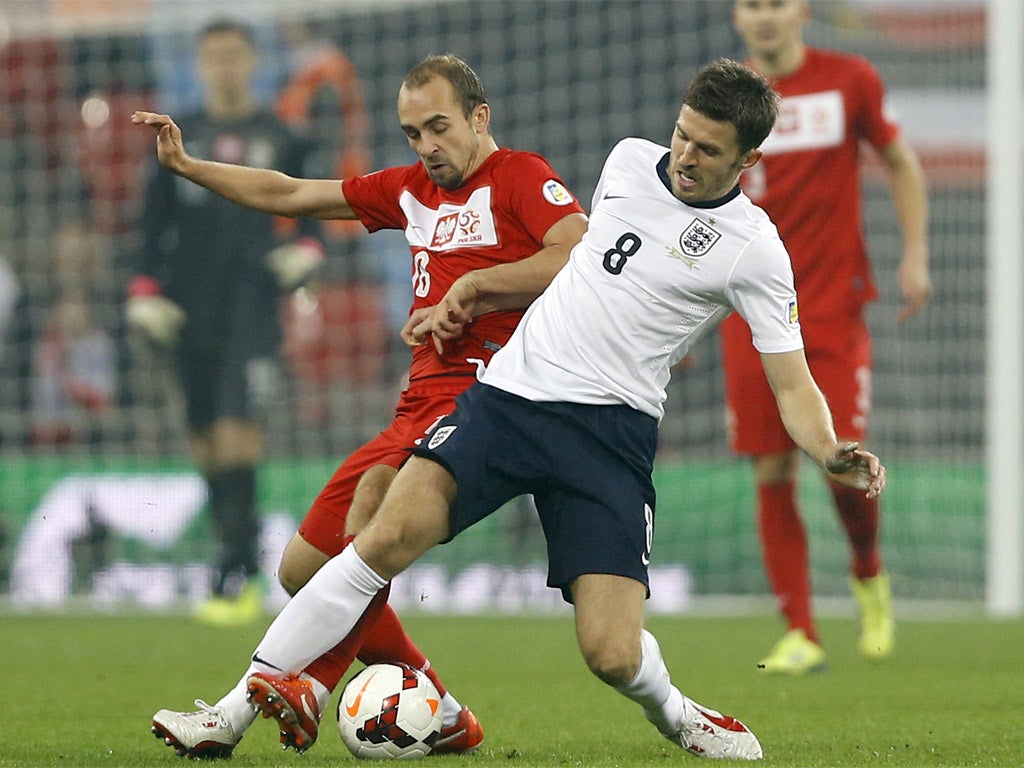Analysis: Michael Carrick gives Steven Gerrard the freedom to roam - but the Manchester United midfielder continues to divide opinion
Positional awareness allows others freedom to play

When the news broke that Michael Carrick was playing, Twitter went into meltdown. Many tweeters thought it was an excellent, long overdue decision, just as many were shocked and appalled that he had been preferred to Frank Lampard and Jack Wilshere. Many judgements were irrespective of club loyalties. That is Carrick in a nutshell: after a dozen years as an international and even longer in the top flight, he still divides opinion like few others.
To some he is a modern Ray Wilkins: passes sideways, looks good in a winning team, no good when the pressure is on. To others he is a modern Wilkins: passes to a team-mate, keeps the ball moving, creates a platform for others to flourish.
It comes down to how you like your midfielders, and the problem for Carrick is that English football tends to prefer them with a big engine, an eye for goal, and a lack of fuss when it comes to such matters as positional discipline and keeping possession. Which is why box-to-box midfielders such as Steven Gerrard and Lampard have a century of caps while Carrick has 30. That is not to decry Gerrard and Lampard, both fine players in their own right, but a football team needs balance.
For an hour, Carrick provided that balance. One measure of his impact was the influence of Gerrard. The knowledge that Carrick was guarding the back door freed Gerrard to push forward and add to the pressure that built inexorably on the Polish goal.
On Friday, Gerrard tended to stay central and deep, as did Lampard. Gerrard was spotted on the right wing as early as the fourth minute. Carrick's presence on patrol also freed Leighton Baines to push forward, knowing that Carrick – who has played in the back four for Manchester United – would drop into the back line as cover if England lost possession.
The other way Carrick shaped the game, decisively, was with his passing. He moves the ball quickly, often forward, and can pass short or long. He is not infallible: shortly after the half-hour he fed the ball back into traffic instead of whipping it out wide to an unmarked Baines. He acknowledged the error with a wave to Baines. When the ball came to him a few minutes later, he whipped it first time to the left, giving Baines time and space to deliver the sumptuous cross from which Rooney broke the deadlock.
Like Darren Anderton and, in his Real Madrid period, Steve McManaman, Carrick's ability to find a player in the same coloured shirt has not been appreciated as it would be in other countries. This was just his eighth competitive international start, an extraordinary statistic for a player who was first capped in 2001.
Why is it that Britain's leading club manager has put him at the heart of five Premier League-winning teams yet a succession of England managers have rejected him? It is true Carrick lacks pace and scores few goals but there has also been a sense that he lacks the personality to impose himself on a match the way he could, and should.
That question-mark was raised again when Poland began to overrun England in midfield and Carrick seemed helpless to stem the tide. His absence from the draw in Kiev was blamed by many, including Gary Lineker, for England's inability to keep possession. But Carrick had played in the disappointing draws at home to Ukraine, in Warsaw and in Podgorica, where he was no more able to prevent Montenegro from over-running the England midfield than Gerrard was.
Roy Hodgson kept Carrick on that night and Montenegro levelled. Against Poland he replaced him with Lampard. England, in fairness, did not get much better as nerves consumed the players and the crowd. But then James Milner and Gerrard sent Wembley into raptures and England Brazil-bound.
Carrick will be 33 two weeks after the World Cup final. He has been to two World Cups but played just 90 minutes, against Ecuador in 2006. This is his last chance.
The strange thing is, after another curate's egg of a performance, he, we and probably Hodgson are none the wiser as to whether he will be in the team this time.
Subscribe to Independent Premium to bookmark this article
Want to bookmark your favourite articles and stories to read or reference later? Start your Independent Premium subscription today.

Join our commenting forum
Join thought-provoking conversations, follow other Independent readers and see their replies